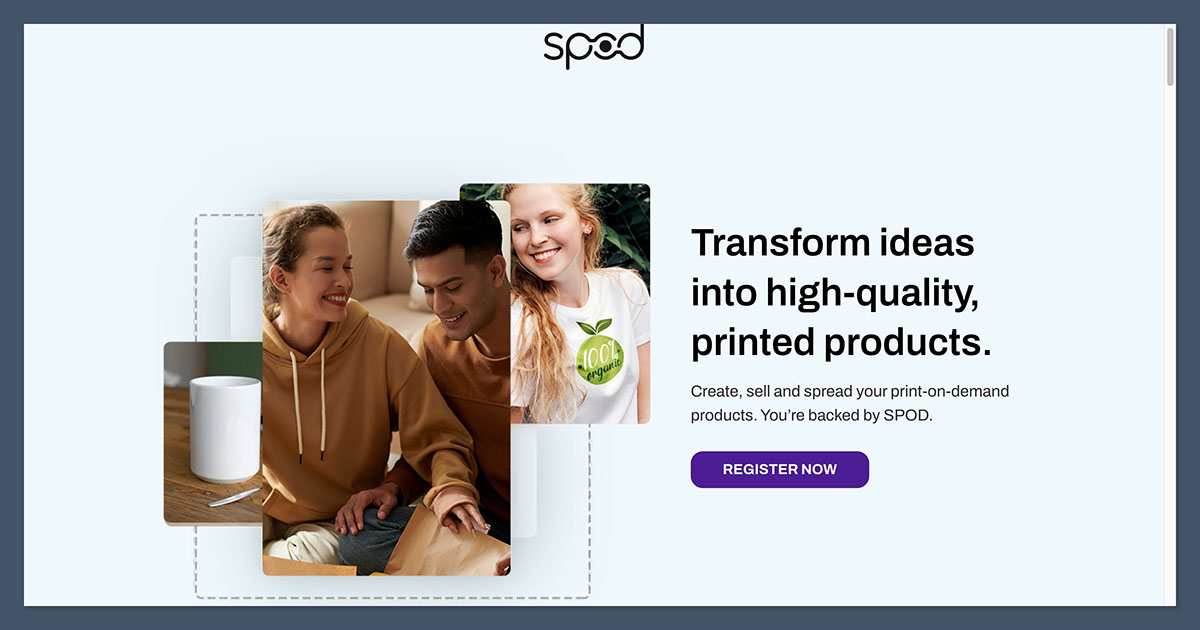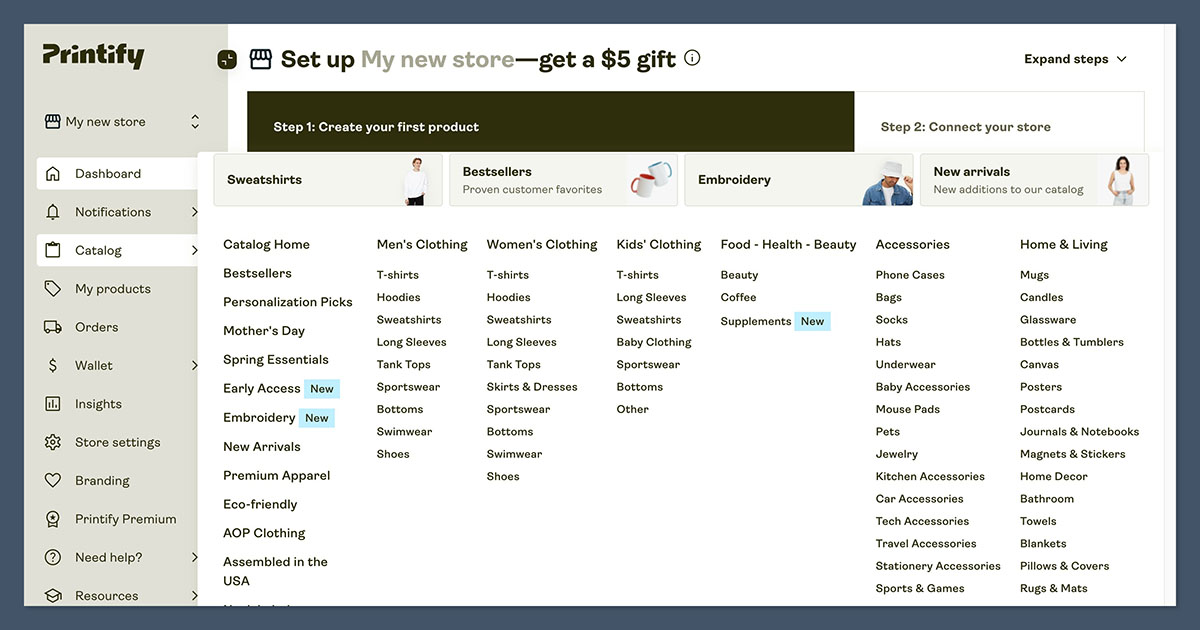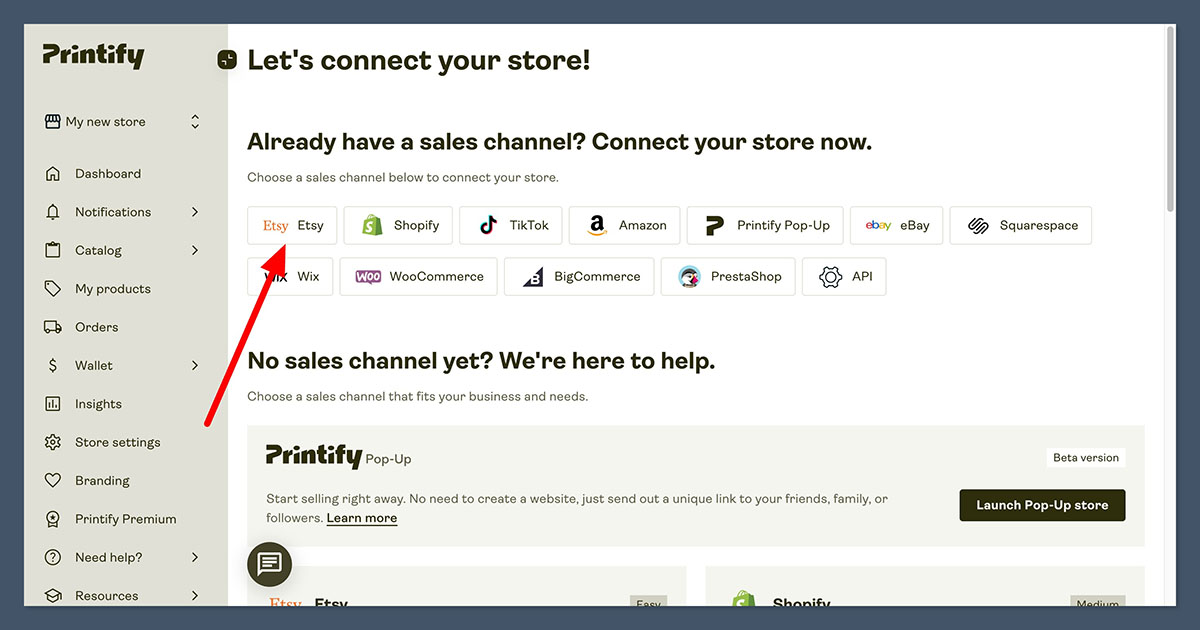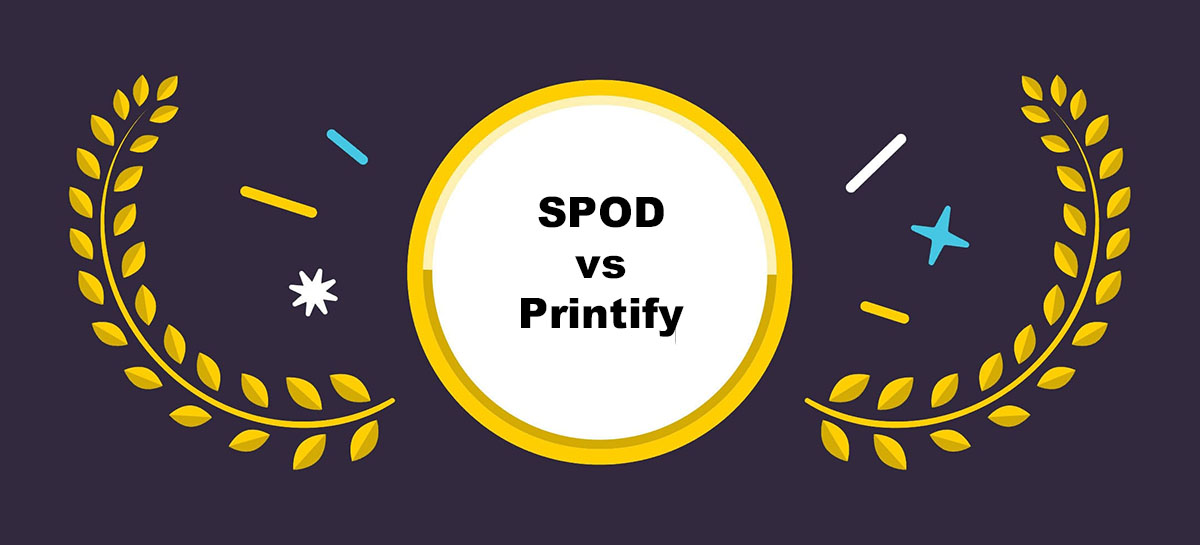SPOD and Printify are two of the most popular print on demand (POD) platforms available today — but which one should you choose for your ecommerce store?
I’ve spent dozens of hours testing and comparing both platforms based on product variety, shipping speed, pricing, ease of use, integrations, and overall value for store owners.
If you’re starting or scaling a POD business, this comparison will help you make an informed decision.
Quick Verdict
Printify – Best overall, ideal for sellers looking for product variety and international reach
SPOD – Best for speed and simplicity, ideal for US and EU-focused stores with fewer SKUs
SPOD vs Printify: Quick Comparison
Here’s a clear side-by-side view of what SPOD and Printify offer:
| Feature | SPOD | Printify |
|---|---|---|
| Product Catalog | Around 200 products | Over 850 products |
| Fulfillment Model | In-house printing | Third-party network of print providers |
| Shipping Speed | 48-hour production | 2–7 business days (varies by provider) |
| Pricing | Free to use | Free, or $24.99/month for Printify Premium |
| Integrations | Shopify, WooCommerce, Squarespace | Shopify, Etsy, WooCommerce, Wix, BigCommerce |
| Custom Branding | Branded packing slips | Varies by print provider |
| Support | Email support | Live chat and email |
| Global Fulfillment | Primarily US/EU | Worldwide (depending on provider) |
Both platforms have their strengths — but they serve slightly different use cases. Let’s dig into the key areas that matter when choosing your POD partner.
Best for Pricing: SPOD (with a caveat)

If you’re looking to keep your product costs low, SPOD usually wins.
SPOD Pricing
SPOD keeps pricing straightforward with lower base product costs across their catalog. This is because they handle production themselves, rather than outsourcing it.
Here are a few example prices (USD):
- T-shirt (Gildan 64000): $7.79
- Hoodie: $18.00
- Mug: $6.99
- Shipping (US): Starts at $3.57
There are no platform fees — you only pay when an order is made.
Printify Pricing
Printify’s pricing varies depending on the supplier you choose. Some products are cheaper than SPOD’s, but others can cost more.
Printify also offers a Premium subscription at $24.99/month, which gives you up to 20% off all product costs. That can make a big difference in your margins.
Example prices:
- T-shirt (Printify Premium): $7.00–$10.00
- Hoodie: $18.50–$27.00
- Mug: $5.00–$10.00
- Shipping (US): $4.00–$6.00 on average
Conclusion
If you’re only selling a few items or testing products, SPOD gives you lower upfront costs. But for scaling, Printify Premium may save you more over time, especially with higher volumes.
Best for Product Variety: Printify

This category is where Printify pulls ahead — by a wide margin.
SPOD Product Catalog
SPOD offers around 200 products. Their catalog includes essentials:
- Apparel (T-shirts, hoodies, sweatshirts)
- Drinkware (mugs, bottles)
- Home decor
- Accessories (tote bags, phone cases)
While the quality is reliable, you won’t find trending or unique items here. It’s more suited for general merch stores or those sticking to a core product line.
Printify Product Catalog
Printify connects to 80+ global print providers, offering over 850 products. It includes the basics but also unique, niche-friendly products:
- Pet beds and bowls
- Car seat covers
- Journals and planners
- Yoga mats
- Duffle bags
- Canvas wall art
You can also offer different print providers for the same product — giving you flexibility to optimize for shipping time, cost, or quality.
Conclusion
Printify wins for variety and flexibility. It’s the better option if you’re targeting a niche or offering a wide product catalog.
Best for Shipping and Fulfillment: SPOD
Speed and reliability matter, especially for US customers — and this is where SPOD shines.
SPOD Shipping
SPOD promises 48-hour production for most products, thanks to their in-house manufacturing.
Fulfillment centers:
- Pennsylvania, USA
- Leipzig, Germany
Average delivery time:
- US: 3–7 business days
- EU: 3–6 business days
Shipping is predictable and streamlined because they control the entire process.
Printify Shipping
Printify’s shipping time depends on the print provider. Some are based in the US, others in China or Europe. Production times range from 2 to 7 days, and shipping can vary widely.
It’s possible to optimize for shipping by choosing local suppliers, but it requires more manual oversight.
Conclusion
SPOD is more consistent and faster for US/EU-based stores. Printify offers more global options but may introduce delays depending on the supplier.
Best for Ease of Use and Setup: Printify
Both platforms are beginner-friendly, but Printify offers more polish in its interface.
SPOD
SPOD is straightforward and built for speed. The dashboard is simple, but not very modern. It lacks the visual polish of other tools, but you can create a product and push it live to your store in minutes.
Features include:
- Drag-and-drop product editor
- Simple product creation wizard
- Basic mockups and previews
If you’re managing a lean catalog and just want to launch fast, SPOD’s minimal layout can actually be a benefit.
You’re not overwhelmed with settings or menus. But as your store grows, the limitations in bulk editing and reporting tools may start to show — especially if you’re juggling multiple product variants or SKUs.
Printify
Printify’s platform is cleaner and more modern. Product creation is smoother with:
- High-quality mockup generator
- Side-by-side variant editor
- Better search functionality
- Integration help built into the platform
Whether you’re on Shopify or Etsy, setting up products is easy and intuitive.

For sellers managing dozens or even hundreds of SKUs, Printify’s interface is better equipped to handle bulk actions.
You can clone products, update variants, or duplicate entire product lines in just a few clicks. The additional visual tools also make it easier to create consistent branding across your store’s inventory.
Conclusion
Printify is easier to use for product setup and store management, especially for larger catalogs or teams managing multiple suppliers.
Best for Integrations: Printify
Printify wins for compatibility with ecommerce platforms.
SPOD supports:
- Shopify
- WooCommerce
- Squarespace
- Order Desk
- Custom API
It’s enough to run a store, but not extensive. There’s no Etsy integration or Wix support.
While these integrations cover the basics, you’ll run into limitations if you plan to sell across multiple platforms or experiment with marketplaces.
For example, there’s no native support for eBay or PrestaShop, which makes SPOD less flexible for multichannel ecommerce.
Printify connects to:
- Shopify
- Etsy
- WooCommerce
- Wix
- BigCommerce
- Squarespace
- PrestaShop
- eBay
- Custom API
This makes it more flexible for sellers operating across multiple platforms.
Printify’s integrations also support more advanced functionality — including automatic order syncing, live shipping rates (on some platforms), and real-time inventory updates.
This creates a smoother backend experience and reduces the manual work required to fulfill orders or update listings.
Conclusion
Printify gives you more control and access to different ecommerce channels.
Best for Branding and Customer Experience: Tie
Branding helps make your store memorable, and both platforms offer limited but helpful options.
SPOD Branding Options
- Custom packing slips
- Branded sender name
- No logo or return address from SPOD
SPOD keeps branding simple, and that’s great for consistency.
But if you want to include promotional inserts, branded stickers, or more personalized packaging — you’ll have to handle that externally. There’s currently no support for adding items like thank-you cards or discount vouchers inside the package.
Printify Branding Options
- Depends on print provider
- Some offer custom packing slips, branded inserts, or custom neck labels
- Not available on all products
You’ll need to dig into each supplier’s branding capabilities to find what’s available. Some high-end providers offer custom neck tags, tear-away labels, or packaging inserts — which can enhance the unboxing experience.
Others stick to generic fulfillment with no branding at all.
Printify also gives you more control when working with multiple suppliers — for example, you can select a provider with full branding capabilities for premium products while using a basic supplier for bulk items or test launches.
Conclusion
Both platforms allow basic branding, but you’ll need to research individual Printify providers if branding is a priority.
Best for Support: Printify
Customer support can make a big difference when things go wrong.
SPOD Support
- Email support
- Support hours: Monday to Friday
- Responsive but no live chat or phone line
SPOD has a helpful knowledge base, but if you run into urgent issues over the weekend — such as order delays, customer complaints, or technical bugs — you’ll be stuck waiting until Monday.
There’s no weekend or 24/7 coverage, which can be a drawback for high-volume sellers.
Printify Support
- 24/7 live chat
- Email support
- Knowledge base
- Dedicated onboarding support for Premium users
With Premium, you also get prioritized assistance for technical issues or order problems. Printify’s support team tends to respond faster than SPOD, especially during weekends or busy Q4 periods.
The platform’s help center is detailed, and live chat is a useful touch for real-time problem solving.
Printify also offers account managers to high-volume stores or those on enterprise plans.
This can be a game-changer if you’re scaling aggressively and want dedicated support contacts familiar with your account history.
Conclusion
Printify offers more accessible and faster support, especially for time-sensitive issues.
Final Verdict: Should You Choose SPOD or Printify?
After testing both platforms across key areas, here’s my final recommendation:
| Category | Winner |
|---|---|
| Pricing | SPOD |
| Product Variety | Printify |
| Shipping Speed | SPOD |
| Ease of Use | Printify |
| Integrations | Printify |
| Branding | Tie |
| Support | Printify |
Choose SPOD if:
- You want fast, reliable shipping in the US or EU
- You’re focused on core products
- You prefer a simpler setup with fewer moving parts
Choose Printify if:
- You want to sell globally or offer more product variety
- You don’t mind managing different print providers
- You want more integrations and platform flexibility
No matter which platform you choose, the most important thing is to start testing, learning, and improving as you go.
Both SPOD and Printify offer powerful tools to help you build and grow a successful print-on-demand business — it just comes down to which one matches your goals and workflow best.








